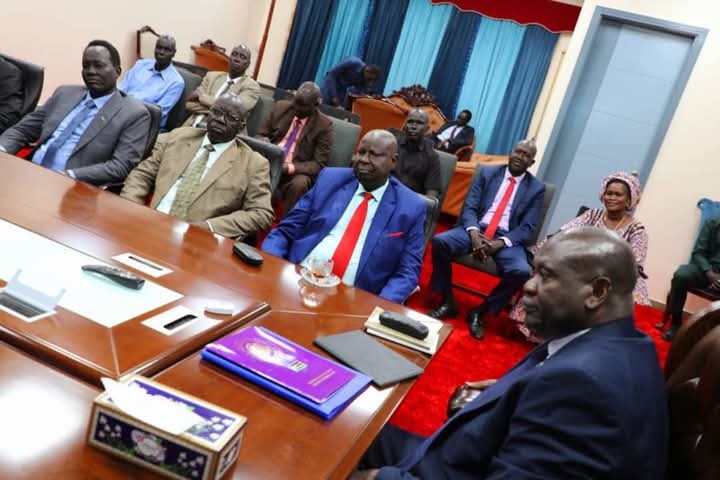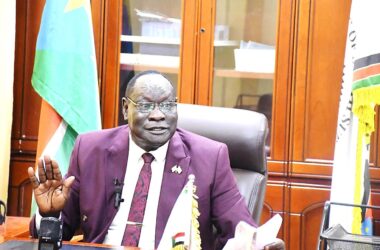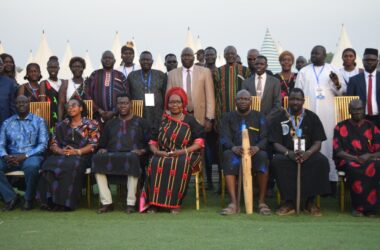By Dogga Morris and Bosco Bush
Long-standing dispute over the status of Abyei Administrative Area has taken a new turn, with the administrative assembly endorsing the 2013 referendum, a step that may be contrary to the 2004 Abyei Protocol.
On Friday, a delegation from Abyei Administrative Area, led by Chief Administrator Dr. Chol Deng Alak presented “Abyei Referendum Endorsement Report” to First Vice President Dr. Riek Machar Teny.
The delegation also discussed with the First Vice President the Abyei protocol and its final status.
Abyei Administrative Assembly endorsed the referendum results on December 27, 2024. This endorsement was in accordance with the resolutions from the 8th Governor’s Forum held in Juba in December 2024, officials say.
According to a statement seen by this outlet, key focus of the meeting was official handover of the endorsement report regarding the Abyei community referendum, which took place in October 2013. This referendum addressed the final status of the Abyei.
“The First Vice President formally received the endorsement report and committed to forwarding it to the Ministry of Justice and Constitutional Affairs. Subsequently, the report will be presented as a memo to the Governance Cluster, the Cabinet, and the National Legislative Assembly for deliberation and endorsement,” it stated.
Abyei, a special administrative area is a contested area between Sudan and South Sudan. Since 2005, when it was accorded the status of a special administrative area, it has been experiencing conflict between the Ngok Dinka and Misseriya communities.
The area is also now complicated by renewed clashes between the Ngok and the Twic Dinka, from the Warrap state of South Sudan. Despite several peace dialogues, the communities continued to conflict.
Referendum Vote
In October 2013, the Ngok Dinka Community in the disputed Abyei region held a unilateral referendum to determine whether Abyei would remain part of Sudan or join South Sudan.
The referendum shows an overwhelming majority of voters estimated at [99.9%] wanting to join South Sudan.
However, the African Union [AU] condemned the referendum as “unacceptable and irresponsible.”
The AU maintained that the referendum violated AU Peace and Security Council (PSC) decisions and could further complicate the search for a common solution based on the framework of existing commitments, given that the issue of voter eligibility had not yet been resolved.
Just before the vote, United Nations Security Council [UNSC] members had expressed “grave concern” about the extremely unstable situation in Abyei, saying the referendum could fuel tensions between Sudan and South Sudan and hamper a solution to the border disputes in the area.
Contrasting View.
Recently, some residents of Abyei have advocated for self-rule as a temporary solution, while others insist on a conclusive resolution to the final status of the administrative area.
Late last year, Dr. Francis Mading, a prominent figure from Abyei, renewed his call for self-rule as an interim means to stabilize the area and foster development.
He argues that the interim measure would allow the people of Abyei to govern themselves while the international community focuses on resolving the broader Sudan-South Sudan conflict over the region.
However, the proposal has not been met well with most intellectuals from the area.
A group of influential Abyei leaders, including Minister of East African Affairs Deng Alor Kuol and Chief Administrator Chol Deng Alak, issued a statement strongly rejecting Dr. Mading’s proposal. They contend that such a move would divide the community and undermine efforts to achieve a lasting solution.
In a letter addressed to South Sudanese President Salva Kiir and other key stakeholders, the group urged the international community to prioritize the resolution of Abyei’s final status.
They emphasized the need for a comprehensive solution that addresses the aspirations of all Abyei residents and respects international law.
“We urge our government to intensify efforts to engage the African Union, the United Nations, and the international community at large to expedite a resolution to Abyei’s final status, inter alia, recognition of the results of the Ngok Dinka Community referendum of 2013 or holding of a new referendum based on the African Union Mbeki proposal of September 21, 2012,” the statement partly read.
The group expressed that Dr. Francis Mading failed to take into consideration the close relationship between the people of Abyei and South Sudan.
They further maintain that the community consensus for self-ruling, as stated in Dr. Francis Mading Deng’s assertion, remains baseless, citing that the idea is supported by a small number of people with an agenda of division.
“Dr. Francis Mading Deng’s divisive proposal represents an insignificant minority view that does not reflect the true desires of the Ngok Dinka of Abyei people,” the statement read.
The Ngok Dinka people of Abyei remain steadfast in their resolve to remain an integral part of South Sudan, it added.
The group stated that while Dr. Francis Mading Deng presented his intentions as attempts to secure peace, stability, and self-determination for the people of Abyei, it failed to consider the well-being and aspirations of the Ngok Dinka people.
“This proposal, therefore, attempts to undermine Abyei’s historical and cultural ties to South Sudan and disregards the hard-fought progress and gains made in recent years to integrate Abyei into its rightful place within the fabric of the South Sudanese nation,” It added.
In his assertion, Dr. Francis said the South Sudan has neglected Abyei or failed to provide adequate services to its people.
The group expressed that the current violence cannot be blamed on the South Sudan government, citing that the South Sudan government has tried its best to provide security and service to the people of Abyei.
“Since establishing the Abyei Special Administrative Area (ASAA), South Sudan has made substantial efforts to support the welfare of the Abyei people through budgetary allocations similar to those it provides to any other state governments in the country.”
Dr. Francis’ proposal followed a recent protest on October 27th, 2024 by leaders of the Dinka Ngok in Abyei demanding self-governance as the ongoing conflict in Sudan dashed hopes for a referendum to determine the disputed area’s future.
The chiefs from Nine Dinka Ngok chiefdoms presented a memorandum to the United Nations Interim Security Force for Abyei (UNISFA) demanding autonomy for the Abyei region.
However, the administrative Area government condemned the protest by local chiefs demanding self-governance, arguing that such a demand could heighten insecurity and division in the area.
Dr. Francis Mading initially suggested self-rule for Abyei two years ago in response to hostilities with the neighboring communities.
Following the independence of South Sudan from Sudan in 2011, Abyei was left as a disputed area as no side wanted to give the rich oilfields in the region.
Although given special administrative area status as per the 2004 Compressive Peace Agreement (CPA), both South Sudan and Sudan claimed ownership of the area. However, the current war in Sudan dashed some of the existing hope of resolving the dispute sooner.



